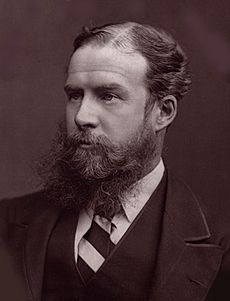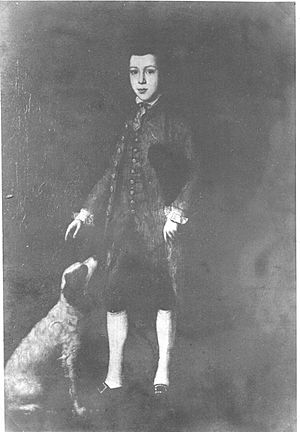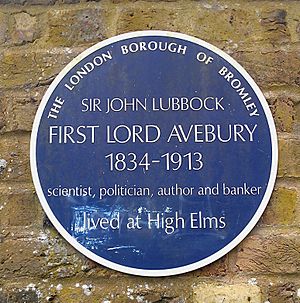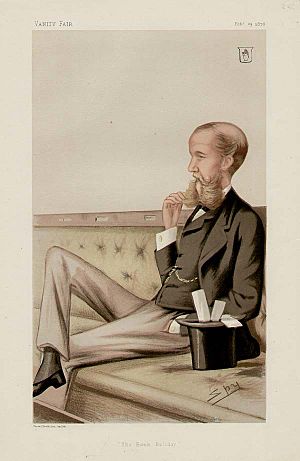John Lubbock, 1st Baron Avebury facts for kids
Quick facts for kids
The Lord Avebury
|
|
|---|---|

Lord Avebury in middle age |
|
| Chairman of the London County Council | |
| In office 1892–1892 |
|
| Preceded by | The Earl of Rosebery |
| Succeeded by | The Earl of Rosebery |
| Personal details | |
| Born | 30 April 1834 London England |
| Died | 28 May 1913 (aged 79) Broadstairs, Kent, England |
| Known for | Bank holidays & the Ancient Monuments Protection Act 1882 |
John Lubbock, 1st Baron Avebury (born 30 April 1834, died 28 May 1913) was an important English person. He was a banker, a Liberal politician, and a scientist. He was also a philanthropist, meaning he helped others through charity. People called him a polymath because he was good at many different things.
Lubbock worked in his family's banking business. But he also made big contributions to archaeology (studying old human history) and biology (studying living things). He created the words "Palaeolithic" and "Neolithic" to describe the Old and New Stone Ages. He helped make archaeology a real science. He also played a part in discussions about evolution in the 1800s. He even introduced the first law to protect old buildings and archaeological sites in the UK.
Contents
John Lubbock's Early Life
John Lubbock was the son of Sir John Lubbock, a banker in London. He grew up at his family home, High Elms Estate, in Kent. When John was young, in 1842, his father told him exciting news. John thought it might be about a new pony! But it was actually that Charles Darwin was moving nearby to Down House.
Young John soon became a frequent visitor at Down House. He became one of Darwin's closest younger friends. This friendship made John very interested in science and the idea of evolution.
In 1845, Lubbock started studying at Eton College. After finishing school, he began working at his father's bank. This bank later joined with Coutts & Co. By the age of 22, he became a partner in the bank. In 1865, he inherited the title of baronetcy from his father.
Lubbock's Work in Business and Politics
John Lubbock was elected to Parliament in 1870, 1874, and 1880. While in Parliament, he helped create many new laws.
He held many important positions:
- In 1879, he became the first president of the Institute of Bankers.
- From 1881 to 1886, he was president of the Linnean Society of London.
- In 1881, he was president of the British Association.
- In 1883, he started the Bank Clerks Orphanage. This charity now helps bank employees and their families.
- In 1884, he founded the Proportional Representation Society, which works for fair elections.
Lubbock also received special degrees from famous universities like Oxford and Cambridge. In 1878, he became a trustee of the British Museum. From 1888 to 1892, he led the London Chamber of Commerce. He also served as chairman of the London County Council from 1890 to 1892.
In 1890, he was made a Privy Councillor. This is a special advisor to the Queen or King. In 1891, he led a committee that designed new coins. In 1900, he was given the title of Baron Avebury. This title was named after Avebury, a very large Neolithic (New Stone Age) site in Europe.
John Lubbock's Discoveries in Biology and Archaeology
In 1865, Lubbock wrote a very important book called Pre-historic times, as illustrated by ancient remains, and the manners and customs of modern savages. This book was one of the most important archaeological books of the 1800s.
In this book, he created the terms "Palaeolithic" and "Neolithic". These terms describe the Old and New Stone Ages. More importantly, he used Charles Darwin's ideas about evolution to explain human nature.
Lubbock often wrote letters to Charles Darwin, who lived close by at Down House. Lubbock lived in Downe for most of his life, except for a few years. Both men were interested in changing how English words were spelled. They were members of the Spelling Reform Association.
Darwin rented land from Lubbock's father for his daily walks. In 1874, Darwin and Lubbock traded land. When Darwin died in 1882, Lubbock suggested that he be buried in Westminster Abbey. He helped arrange this special honor and was one of the people who carried Darwin's coffin.
In 1893, Lubbock was chosen to be a member of the American Antiquarian Society. This group studies American history and culture.
Lubbock's Family Life
John Lubbock had a large family, with eight brothers and three sisters. His first wife was Ellen Frances Horden, who passed away in 1879. Five years later, he married Alice Lane Fox. Her father was Augustus Pitt Rivers, another important archaeologist.
Lubbock rebuilt Kingsgate Castle in Kent to be his family home. He passed away there in 1913. His oldest son, John, inherited his title.
Images for kids
-
Lord Avebury speaking during the presentation of the first replica of Diplodocus carnegii to the trustees of the British Museum of Natural History, 12 May 1905
See also
 In Spanish: John Lubbock para niños
In Spanish: John Lubbock para niños







